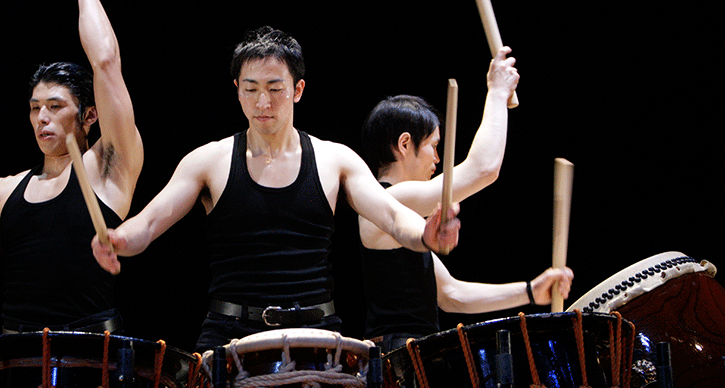Our Interview with Kodo’s Jun Akimoto

Photo: Kodo in performance. Photo by Takashi Okamoto.
Kodo perform in Hill Auditorium on February 15, 2013. With over twenty visits to Ann Arbor over the years, Kodo return with a brand-new performance that includes new visual flair alongside its high-energy percussion, elegant music, dance, and the striking physical prowess needed to sustain a precise yet powerful sound.
We chatted with Jun Akimoto, the group’s company manager, about the power of taiko drums, Kodo’s mission to represent the living folk performing arts of Japan, and what they’re looking forward to in their upcoming visit to Ann Arbor.
UMS: Could you talk about the choreography of Kodo performances? What does it mean to be a part of sharing this rich Japanese tradition?

Jun Akimoto
Jun: Our artistic director Mr. Tamasaburo Bando, is responsible for the artistic direction of Kodo, and he has been working with us for 12 years. Actually, it does not seem to sound appropriate for us to call the movements of Kodo “choreography” since the company’s focus is Japanese drumming, not dancing. Having said that, Mr. Bando, is a renowned Kabuki actor and dancer. His rich and profound philosophy and knowledge and technique of “body” have inspired Kodo immensely at the deeper level. Body movement techniques generally used in many of the Japanese performing arts have something in common beyond the different forms and styles, so the performers of Kodo often feel a kind of cultural synchronicity in Mr. Bando’s comprehension about “body.”
UMS: Can you share your experience about the Kodo Village? How does living there enhance your craft?
Jun: Sharing time and place during the daily life in the Kodo village surely influences what the each member of the company thinks and creates. Particularly, Kodo is known for the collective beauty and unity of the performance. This unity comes from how members of Kodo live at the headquarters of Kodo on Sado Island.
In Japan, I think this sort of mental/physical connection has been cherished and inherited from the traditional way of life in the Japanese feudal societies of the past, which were mostly supported by agrarian communities. Sado Island is one of the rural regions that still retains the traditional ways of life. Kodo owes so much to Sado and the local people, because living there constantly reminds us that folk performing arts are an important part of the life of a community.
UMS: What are the different types of drums that will be used during the performance? What do some of the drums represent?
Jun: Japanese drums, or taiko, have a very simple structure, but they are also seen as the communication tools used between the gods and the people, nature and the people, and people and people. Taiko is a very popular instrument in Japan and is often found in most shrines and temples.
Some types were originally imported through China and Korea. Kodo uses several types and sizes of taiko on stage, but we always feel that the simple but beautiful (and very strong) instrument acts as a door that opens us to the nature. These drums are made of a wood trunk with animal skins tacked to the drum body. It is said that the gods reside inside the taiko and the harder the drums are played, the more pleased the gods become. And, most importantly the drums are the symbol of community and unification.
UMS: Your music is a powerful reflection of both the history and the future of Japanese performing arts. How to you hope Kodo will evolve in the years to come?
Jun: The history of taiko as part of the commercial performing arts is still young and in development when compared to other established Japanese professional performing arts with hundreds of years of history, such as Noh, Kyogen, Bunraku, Kabuki, etc.
Kodo prioritizes the direct connections with the actual living “folk” traditional performing arts found in many regions in Japan (often in countryside and unknown to outsiders). These folk performing arts solidify a community through ceremonies, festivals, and rituals. In the years to come, Kodo hopes to not only continue as a commercial performing arts ensemble, but to be true to direct voices of living folk performing arts.
UMS: What cultural message do you hope will resonate with the audience of Ann Arbor?
Jun: We are very fortunate and honored to have had a long relationship with Ann Arbor. As generations shift both in Ann Arbor and in Kodo, we truly hope that Kodo will continue to refresh, develop, and keep our good relationship between the people in Ann Arbor and Kodo. We are looking forward to performing “Legend” (our new production) in Ann Arbor very soon!







